The Windows RT Review
by Vivek Gowri & Anand Lal Shimpi on October 25, 2012 12:00 PM EST- Posted in
- Windows RT
- Operating Systems
- Microsoft
- Mobile
- Windows 8
- Tablets
Internet Explorer 10
There are two distinct versions of Internet Explorer 10 - one that runs in the desktop and looks very similar to the IE9 and IE10 experiences that we’ve been used to on the Windows 7/Windows 8 desktop, and another that runs within the framework of Modern UI and looks like an upscaled version of IE9 Mobile from Windows Phone 7.5 Mango. Both use the same rendering engine and perform identically, so we’ll keep that in mind when looking at performance numbers. Other than the user interfaces, there’s relatively little difference between the two browsers, though you will need to open the desktop IE10 to change browser settings - there's no way to do so from within Modern UI.
Gestures in the Modern UI version of IE are very important - swiping from the top or bottom brings up the URL bar at the bottom and the thumbnail list of open tabs at the top. It looks great, and keeps the webpage completely clean, but I don’t think the tabbed browsing implementation here is that great - I’d rather see something like Chrome or Safari with the list of open tabs always displayed at the top of the window. Changing tabs requires an extra step (swipe, then select), which isn’t ideal for changing between tabs quickly. If you deal with a lot of open tabs, or have some need to flip between two specific tabs repeatedly, this will get annoying relatively swiftly. It still looks great, and for touch-based browsing it works quite well other than the concerns over tabbed browsing. The “fancy” version of IE10, as Anand called it, strikes me as a very idealistic design philosophy that doesn’t necessarily work as well as a less elegant interface might.
One feature that works very well but could use some performance tuning is the back/forward touch navigation for Modern UI's IE10. To go back a page just swipe from left to right (or right to left to go forward). It's incredibly intuitive. My only complaint? Although going back immediately shows you the previous page, you have to wait for the page to actually re-render before it's usable (which on present day ARM hardware isn't exactly fast). I suspect this is something that will become far more useful over time with faster SoCs.
The desktop IE10 is just desktop IE, you’ve seen this before. Nothing that new, the UI looks pretty similar to IE9 (which is the first version of IE I can remember enjoying, though it will never replace Chrome in my heart) and it functions similarly as well. Obviously, there’s an updated rendering engine, but other than that and a new scrollbar design to match the rest of the Modern UI visual style, there’s not much to see here.
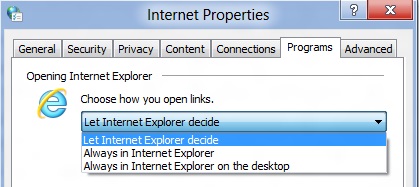
The most interesting part, actually, is in the settings - you can set links to default open in Fancy IE10, the desktop IE10, or let IE decide which to use on a contextual basis. You can also have the IE10 tile in Modern UI to open the desktop IE10, so you can basically ignore the new IE10 UI entirely should you want to do so. Now, I suspect this option exists primarily for desktop and notebook users of Windows 8, who don’t want to deal with using the Fancy IE10 interface with a mouse input. But it’s there for Windows RT users who want to use only the desktop IE10 UI. Personally, I wouldn’t want to use the classic interface in touchscreen devices - UI elements are damn small at this pixel density, making it more difficult to hit the right buttons than it needs to be. There’s a reason the Modern UI variant of IE10 exists.
Performance
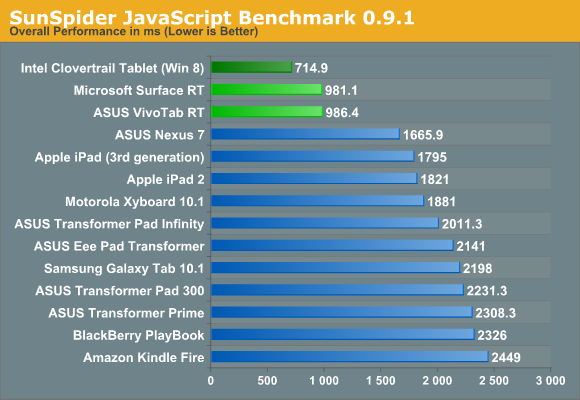
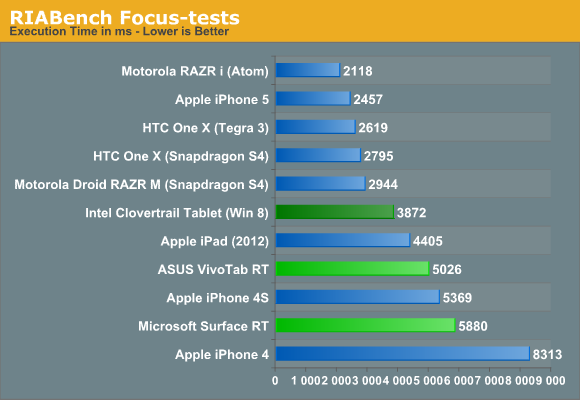
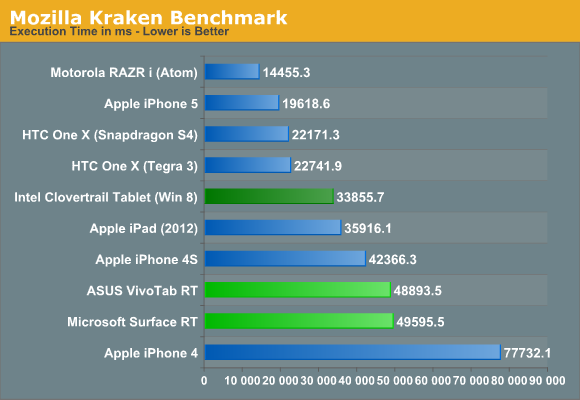
From a performance standpoint, we’ve just brought over the same three benchmarks that were used in the VivoTab RT and Surface RT reviews - SunSpider, RIABench, and Mozilla's Kraken. Honestly, I think SunSpider scores are becoming irrelevant - as one of our commenters said, the art of getting better SunSpider scores has started becoming a race to see who can cheat on the test most. Cheating in this case would be considered optimizing browsers for this specific test, and they’re not wrong. While IE10 has great, great SunSpider scores, it’s far behind in the other two JS benchmarks compared to similar hardware running on other platforms - look at the Surface or VivoTab RT compared to the international Tegra 3 version of the HTC One X. And I’m almost certain that if we had a Nexus 7 on hand to run those tests on, the differences would be larger still.
The HTML5 Test score 320 (plus 6 bonus points) is better than most tablet browsers from a year ago, but lags behind the latest mobile versions of Safari (386+9) and Chrome (390+11). Our Windows 8 Consumer Preview article showed that IE10 had made some pretty significant strides from IE9 (which was leaps and bounds better than 8, and then some) but JS performance is still behind the curve for now. The experience doesn’t suffer from that though - it’s still a very capable modern browser that won’t leave you disappointed.


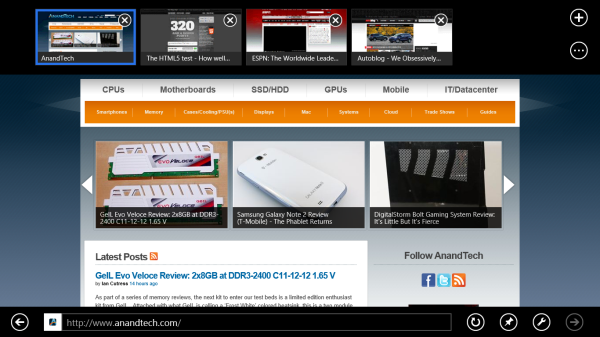








233 Comments
View All Comments
tipoo - Friday, October 26, 2012 - link
I'd like to know that as well. But if it kills even my Core 2 Duo, I don't expect current ARM chips to fare well with that many tabs, but I'd still like to know how it handles background tab loading.Mahadragon - Friday, October 26, 2012 - link
Thanks Anand for the best review of RT I've seen yet. Gives me better idea of what's to come, however it doesn't address the question should I buy Win8 for desktop? The upgrade offer ($40) is out now but I don't seen compelling reason to buy it. You mentioned in your review that Apple has their desktop computer and mobile offerings separate, but the way Win8 is being implemented it sounds like maybe they should have kept it that way.In your review you said it was jarring how it would revert back to the desktop environment when you touched on a desktop app. It's comments like this that make me wonder why upgrade from Win 7? Are the apps that will eventually come to the desktop be all that useful? I suppose if there were a handy Calendar App that could auto-sync with my mobile device that would be nice, but there are already many apps (like Google Calendar) that I can already use to sync between mobile devices.
Your review has given a great many reasons to purchase a Surface tablet, but that's not the decision many of us are facing right now. $500 is not chump change and that doesn't even include the keyboard which is another $100. I just bought a new iPod Touch and will be using that for mobile computing since my Windows Phone 7 device is not nearly as user friendly.
I think MSFT could have kept Win8 same as Win7 with an option to run ARM apps built-in. I think this would have made more sense since they don't have too many apps to begin with. Also, I don't think these little apps, which are optimized for tablet, will necessarily give a great experience on a desktop monitor that you won't be touching.
It almost seems like MSFT is trying to encourage people to buy the tablet by frustrating them with a rough desktop experience and making it smooth on the Surface. Thank you for going over the history of MSFT's initial forays into the tablet space. It's something very few people realize. Yes, MSFT, always the innovator was the first to come out with a tablet over 10 years ago, but nobody even knew about it.
Fortunately for MSFT, there is a god (or rather, Apple) who has always been there to show them the light. Apple: "Use a touchscreen, not a stylus!" MSFT: "Ok, sorry, we thought everyone would cherish the thought of using a digital pen to interact with their tablets. Apple: "Make an App Store and sell software programs through it so people can add functionality to their devices!" MSFT: "Ok, that's a great idea, wish we thought of that." Apple: "Add a camera! People like to take photos." MSFT: "Done." Apple: "Come out with your own retail stores so you can sell to people directly!" MSFT: "Ok, we can do that." Apple: "Always remember to copy us verbatim but not too much. We don't want to have to sue you (again)." MSFT: "Ok, we'll make our products geeky instead of dead sexy how about that?"
yyrkoon - Sunday, October 28, 2012 - link
If you're already using Windows 7, chances are pretty good that you'd just be wasting money.Windows 8 obviously was made for mobile devices. Then perhaps it will perform somewhat faster on the same hardware. But if you're looking for better gaming performance you probably will not see much of a difference there.
The app store is a terrible idea in its current incarnation. I do not know many ( any ) software developers who would be happy about paying a 30% forced fee for any software platform. These same developers who draw users en mass to an operating system by creating many, useful applications. Or, I should say *did*.
Dorek - Friday, November 2, 2012 - link
"Apple: "Add a camera! People like to take photos.""Uh, the Surface doesn't have a rear camera. Rear cameras on tablets are freaking stupid.
Anyway, if you care about such things, Windows 8 has much faster performance than Windows 7. Well worth $40 bucks to me.
shermanx - Friday, October 26, 2012 - link
where's the Wacom digitizer/pen/stylus? while so many tablets are trying to be different from others, I am surprised how few have included a functional pen for taking notes. that is really important feature for education business, and there's nothing that's really working well now. I just need Wacom Bamboo level of experience with a screen on it at a reasonable price.darkcrayon - Saturday, October 27, 2012 - link
There will be a digitizer on the Surface Pro, though I think the pro will be even more of a different market than the RT, considering it will be even larger and heavier.yyrkoon - Friday, October 26, 2012 - link
"The only applications that are allowed to run in desktop mode under Windows RT are Explorer, IE10, Office 2013 and the command prompt "This will either make or break Windows RT. Also, I bet this is a form of DRM imposed by Microsoft. While not DRM per se, they get to say which application we can install on our systems. Good, or bad ? I really do not know. It really depends on how they implement their online store. As I have not used windows 8, or Win RT. However, if it is similar to the google app store. Developers are required to pay an annual $25 USD fee. Which if you ask me, is slightly detrimental to the given community. In that people will be more inclined to charge for their applications, instead of providing FOSS( free open source software ). $25 USD though, really is not all that much.
One thing I can say however. Is that Microsoft sure is pushing their latest mobile software development kits through their mailing lists. Good or bad ? Again, I do not know. I am currently with android development, and unless I see something inspirational from Microsoft. That will likely not change soon. If ever. That is, for mobile devices. On the desktop I still prefer to develop with / on Windows using the .NET base class library.
yyrkoon - Friday, October 26, 2012 - link
Also Anand,I really do not think third party apps will be a problem. At least where the browser applications are concerned. With all the javascript libraries that abound now days, coupled with HTML5 and CSS3. "Offline webapps" will be easy to make, and provide a lot of possibilities. These apps, should work the same on any OS.
Native apps . . .is where Microsoft excels on the desktop At least from a developers standpoint. The .NET base class library takes a lot of work out of software development, and provides many, many useful classes. How this works, or will work cross platform from x86 to ARM I am not exactly sure. But I suspect Microsoft has it covered. As always. Having done a lot of research lately on mobile device development, I know that Microsoft is providing a lot of software development kits. Some that look extremely attractive at first look.
From a software developers standpoint. Windows 8 / Windows RT looks really attractive right now. Since the market is virtually wide open for software developers to make themselves a name.
Now do keep in mind that everything mentioned above is from a developers mindset. As a user . . . yours truly really likes to keep as much freedom as possible. How that works out again is based on how Microsoft implements their app store. Also, if Microsoft can somehow remove the mobile device from the stigma of being a toy. I think they'll have it nailed. We know the OS polish is going to be there for anything Windows lately. So it basically boils down to ( again ) good software availability.
yyrkoon - Saturday, October 27, 2012 - link
Yeah, disregard what I said above.According to what I have just read. Microsoft wants a 30% fee for using their app store. From the developer . . . so yeah Microsoft can kiss my ass as far as Windows RT is concerned.
If they keep on like this, personally I do not care how much work the .NET framework saves me. I will move to another platform and write off their operating systems al together. And I know im not alone.
~joe - Saturday, October 27, 2012 - link
I have one question to anybody owning Windows RT device (particualry Surface). I'm writting from Poland, and so far there is no plans for selling this device here. So I want to buy my in USA. My intention of use is 70% content consumption and 30% content creation using Office. But I need for my work Polish language. The question is - can I switch language to Polish (or ownload Polish language pack)?